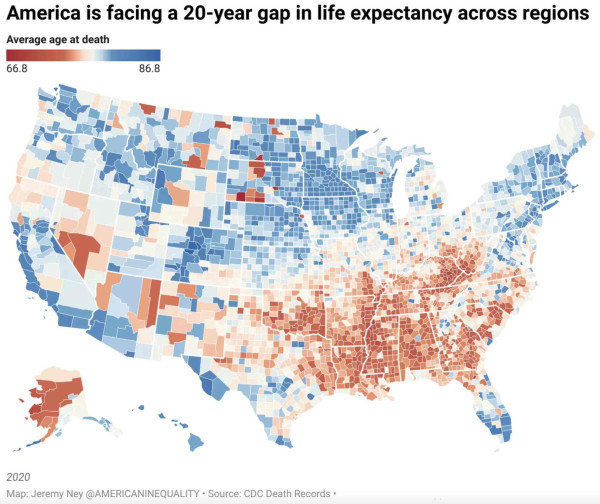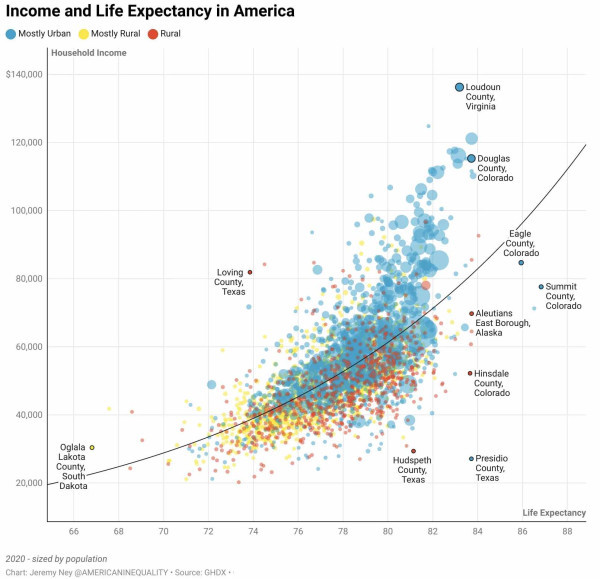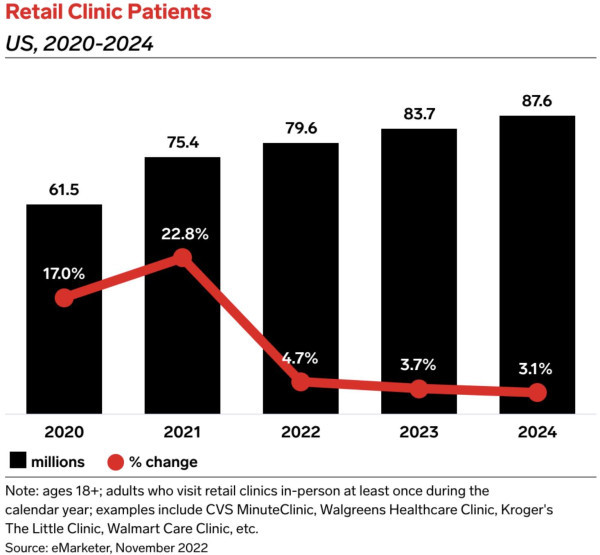Personalized Medicine: What It Is, Why It’s Popular, and Why It’s Not Going Anywhere

The math just doesn’t add up.
Although the US spends more money per capita on healthcare than any other country in the world, the US lags in life expectancy, ranking 48th highest in the world.
From a purely return on investment standpoint, the costs certainly outweigh the benefits here…
There are a number of reasons why life expectancy falls short in the US. Unfortunately, life expectancy is directly correlated to where in the US someone lives, their demographics, and how much money they make – factors that should have zero bearing on how long someone lives.

What life expectancy should correlate with is the healthcare spend – but it doesn't.

Not only does the math not add up, but consumers have begun to feel it themselves, with more than half of US patients feeling like the healthcare system deserves a “C” or below.
Here are some of the reasons consumers are disenfranchised with the healthcare system:
- Astronomical costs
- The focus on profitability over actual care
- Rise of Medicine 3.0
- Long wait times + short visits with provider
- Prohibitively confusing system to navigate
- Depersonalization in consumer experience
It’s worth pointing out that doctors aren’t the bad guys. In fact, many of them aren’t thrilled with the way the system is set up and are increasingly burned out themselves.
That said, there’s an undeniable shift to new healthcare models that place the focus back on the consumer, a large part of that shift includes the rise of personalized medicine.
What is personalized medicine?
Personalized medicine, also known as precision medicine, is an approach to an individual’s health where his or her genetic makeup determines the best way for that person to prevent and treat disease.
How is personalized medicine related to longevity?
With personalized medicine services, a client will complete genetic testing, bloodwork testing, and lifestyle assessments, which allow healthcare experts on staff to provide the client with a tailored personal health plan. This plan and the ongoing health coaching that is typically included in personalized medicine services are intended to improve the client’s health and increase his or her longevity.
More often than not, personalized medicine not only tackles disease but allows customers to get into the best shape of their lives, in turn extending the number of quality years they get to enjoy in their lives.
In fact, one of the issues with conventional medicine is the trial-and-error approach, where a doctor prescribes drugs based on the “most likely” diagnosis, determined by the presented symptoms. Personalized medicine uses “more refined diagnostic testing … to select the best treatment and determine the right dosage.” And this is specifically regarding fighting disease, saying nothing of simply optimizing one’s health from good to better, one of the most common reasons people utilize personalized medicine.
Personalized medicine strikes a balance between being proactive with one’s health while still relying on experts to help make sense of the data and provide actionable insights (read: what actions can someone do to most effectively improve their health and increase longevity).
What’s included in personalized medicine?
When shopping for a personalized medicine service to use, you’ll find that most services include the following:
- Genetic testing (captured by blood, urine, stool, or saliva)
- Bloodwork testing
- Visits with a physician, nutritionist, or health coach
- Personalized health plan (including supplement recommendations)
- Ongoing access to health professionals or coaches
- Discounts on recommended products, services, and follow up testing
Why are people turning to personalized medicine?
A combination of consumerism and highly accessible information is forcing new trends in healthcare. Not only do customers want an experience that is convenient and personalized, but with the amount of information that’s available, customers are better equipped to be part of the decision-making process when it comes to their health. Long gone are the days when the entirety of customers’ health needed to be outsourced to medical professionals.
Trends in healthcare
Here are a few of the trends in healthcare we’ve been seeing and will continue to see:
- Shifting focus from disease treatment to disease prevention
- Increased interest in longevity
- Remote healthcare
- Concierge medicine
- Personalization: turning away from one size fits all model
- Wearables
- Retail health
Evolution in healthcare and longevity
As Peter Attia alludes to in his latest book Outlive, we’re shifting from the outdated Medicine 2.0 model and stepping into Medicine 3.0, where we’re no longer treating full-blown illnesses but preventing them from even occurring.
With Big Pharma being an inseparable part of Medicine 2.0, from a systemic and monetary perspective, the current healthcare system becomes increasingly outdated. To most effectively avoid surgical interventions and emergency care, consumers understand the best approach is preventative care, and for many, personalized medicine provides the most targeted approach to preventative care. Ultimately, preventative care is equated to longevity and living a longer life.
Consumerism in healthcare
The rise of new business models in healthcare point to the dominance of consumerism.
Today, we’re seeing an increase of remote healthcare options, such as virtual healthcare (even Amazon is in on it) and healthcare communities. Although telehealth has declined since the peak of the COVID-19 pandemic, the pandemic has made telehealth an undeniable facet of the healthcare landscape today and in the future. Online options provide convenience and lessen the resource burden on both the hospitals and clients alike.
Additionally, as consumers are more than willing to pay for convenience, personalization, and an improved customer experience, they increasingly turn to options such as retail health and concierge medicine.

Retail health, such as CVS’s MinuteClinic, provides consumers with low-cost, basic healthcare that is much more accessible than traditional primary care. With concierge medicine, clients get more frequent access to their provider, with lower wait times, which gives them the quality of care they value the most.
Increased ownership in individual health
Although we joke about WebMD’s ability to make hypochondriacs of us all, it’s undeniable that the information and technology age that we’re in has allowed us to take more ownership of our health.
We now have access to a lot of the health information that we’d only have access to by visiting a doctor, which allows us to be better-informed in both the medical diagnosis and treatment processes. Additionally, there’s more technology today that allows us to gauge our own health and make health decisions on our own accordingly, such as wearables, at-home diagnostic tools, and the countless subscriptions that accompany these tools.
Top names in personalized medicine
Personalized medicine services can vary in personalization, and by that we mean the amount of one-on-one service you have access to throughout the process.
For the most DIYers, you can simply order an at-home test kit and interpret the results yourself. An epigenetic test can also help if you’re just getting started in wanting to know where your health currently stands (based on your current biological age) and what you can do to improve it. Here are a few services that provide at-home health test kits:
For those willing to spend a little more to get more expert input and recommendations, here are other personalized medicine services to check out:
Personalized medicine is here to stay
We live in a fortunate time, where we get to explore ways to increase both our lifespan and healthspan, maximizing the number of years we get to enjoy while we’re alive. The predominance of consumerism, accessibility of medical information, and the exponential rise of technology have contributed to the rise of new healthcare options, including personalized medicine.
Whether you consider yourself a biohacker, a top-level executive looking to optimize his or her energy, or simply someone looking for alternatives outside of traditional primary care, take the time to explore some of the options above, as personalized medicine may be a helpful tool in your health and longevity toolkit.
You can also explore: Longevity 101: The Ultimate Guide To Increasing Your Healthspan & Lifespan
About the Author
Sign Up For Our Newsletter
Weekly insights into the future of longevity
